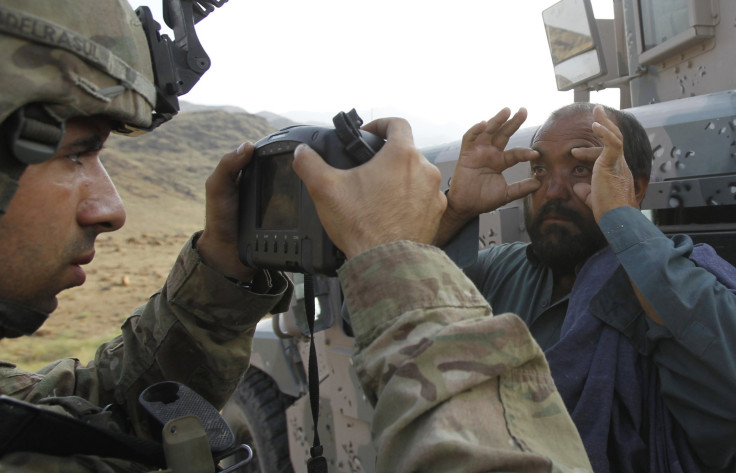Iris Scanners, Widely Used By US Military, Could Be Coming To A Police Department Near You

Iris scans could become part of a routine traffic stop, thanks to technology being developed by researchers at Pittsburgh’s Carnegie Mellon University that can grab an image from a distance of 40 feet. The technology would allow police to take an image the second a driver glances into the rear-view mirror.
“It’s no different than a camera taking a picture of you,” said Marios Savvides, a research professor at CMU’s computer engineering department and the director of the CyLab Biometrics Center. “You could be anywhere within a 6- to 12-meter radius and it will find you and zoom in and capture your iris.”
The technology would be a major development for iris biometric scanners, which have been hampered for years by accuracy at long distances. But adoption also would create legal questions by relying on technology that's similar to the local license plate databases that have been in use in Virginia, California and other municipalities.
“It could be used surreptitiously,” said Jennifer Lynch, an attorney at the Electronic Frontier Foundation, which is monitoring the development of the technology. "That could lead to the ability of law enforcement officers to collect a person’s biometric information without their knowledge."
The U.S. military has been using iris scan technology for more than a decade in the Middle East, in part to help determine who is authorized to enter military facilities in Iraq and Afghanistan. U.S. soldiers in combat zones often take a snapshot of an individual 6 inches from their face, at which point the data is uploaded to a wide-ranging database that includes everything from scar information and mug shot images to height and eye color data.
The Department of Homeland Security has a similar database on foreign nationals and Americans working abroad, though the existence of a domestic database hasn't been reported outside of the FBI's Next Generation Identification system. The government has given CMU millions for its iris scanner research, and Savvides is in talks with Seraphim Global, a Virginia-based nonprofit dedicated to fighting human trafficking, about identifying suspected missing and exploited children from a distance.
But in order to effectively identify someone, the scanner would need to compare its just-captured iris to a database of stored information. That’s where the privacy concerns come in.
The Electronic Frontier Foundation has filed multiple lawsuits against U.S. law enforcement with the goal of finding out about existing facial scanning technology. The problem, according Lynch, is that unlike fingerprints, police could collect information about someone’s physical body without legal authorization. If this kind of technology was deployed in an area like Manhattan, where tens of thousands of surveillance cameras are filming, it could enable real-time spying on people not suspected of any wrongdoing. "As a democratic society, I think we should all be concerned about this," she said.
And it's unclear whether police departments want or need the technology. Thanks to a license plate scan, police officers already know who’s in the car before they approach, said Rich Roberts, a spokesman for the International Union of Police Associations. If that doesn’t work, the police officer can call in the license plate number to dispatch.
“There’s an awful lot of high-tech stuff out that’s available to law enforcement. However, a lot of it is not well proven and there are a lot of policy issues here,” Roberts said. "Another big problem is cost: Too many police departments are already understaffed because of budget problems, and that leads to slow response time and a whole host of other problems.”
© Copyright IBTimes 2024. All rights reserved.





















